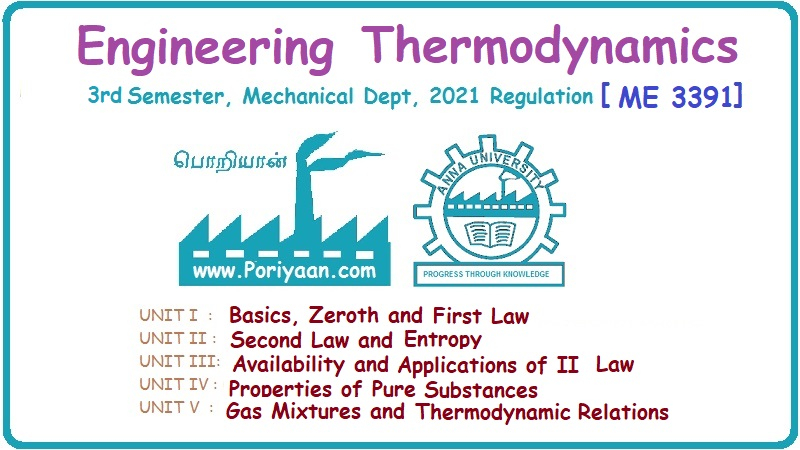Engineering Thermodynamics: Unit V: Gas Mixtures and Thermodynamic Relations
Equation of state for Ideal Gas
Boyle's law states that the volume of given mass of a gas varies inversely with its absolute pressure when the temperature remains constant.
EQUATION OF STATE FOR IDEAL GAS Ideal gas is a substance which obeys the law of where p = Pressure of the gas v = Specific volume of the gas V = Total volume of the gas Boyle's law states that the volume of given mass of a gas varies inversely with its absolute pressure when the temperature remains constant. Charles's law states that the volume of given mass of a gas varies directly with its absolute temperature when the pressure remains constant. This equation is applicable for constant pressure process. Charles's law also states that the pressure of given mass of a gas varies directly with its absolute temperature when the volume remains constant. This formula is applicable for constant volume process. Joule's law states that the internal energy of a given quantity of a gas depends only on the temperature. It is already proven that the internal energy depends only on the temperature but not on both pressure and volume. ΔU = Cv ΔT Regnault's law states that the two specific heats Cp and Cv of a gas do not change with the change of temperature and pressure. In other words, Cp and Cv of a gas always remain constant. The above law is only an approximate one because the specific heats of a gas vary with temperature. Avogadro's law states that equal volumes of different perfect gases at the same temperature and pressure contain equal number of molecules. This law can also be stated, "the volume of one gram mole of all gases at the pressure of 760 mm Hg and temperature of 0°C is same and equal to 22.4 litres." 1 g mole of a gas = 22.4 litres = 22.4 × 10-3 m3 ⸫ 1kg mole of a gas = 22.4 m3 or Otherwise, this law can also be stated as, "all gases whose mass is equal to its mole occupy the same volume at Normal Temperature and Pressure (NTP)." At NTP, pressure, p = 1.013 bar Temperature, T = 0°C Volume, v = 22.4 m3/kmol Mv = Constant Where M = Molecular weight of the gas v = Specific volume of the gas So, the equation of state is multiplied by M on both sides, The general gas equation for ideal gas is given by pV = RT If the mass of gas 'm' is considered, the equation of state becomes pv = mRT This equation is known as characteristic gas equation.

1. Boyle's law:
 This equation is applicable for isothermal process.
This equation is applicable for isothermal process.2. Charles's law:


3. Joule's law:
4. Regnault's law:
5. Avogadro's law:

6. Characteristic gas equation

Engineering Thermodynamics: Unit V: Gas Mixtures and Thermodynamic Relations : Tag: : - Equation of state for Ideal Gas
Related Topics
Related Subjects
Engineering Thermodynamics
ME3391 3rd semester Mechanical Dept | 2021 Regulation | 3rd Semester Mechanical Dept 2021 Regulation
